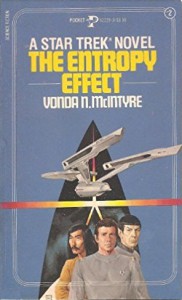The very model of a modern Star Trek novel

When it was originally published in the summer of 1981 Vonda McIntyre's book represented something of a new frontier (if you'll forgive my use of the phrase) in the Star Trek franchise. Though the second entry in Pocket Books's series of Star Trek novels, it was the first original story they published (the first book in the series was the novelization of Star Trek: The Motion Picture). As such, it represented an effort to develop the franchise, rather than the more half-hearted adaptations of the Bantam Books series in the 1970s.
If the series's editors wanted to use the first original novel to set expectations, it is difficult to imagine choosing a better book than this one. McIntyre's novel opens by setting the stakes, as while studying a naked singularity that suddenly appeared in a warp lane, Spock discovers that the universe has only a century remaining before its demise. Before he can verify his data, the Enterprise is summoned to a nearby planet to transport a dangerous prisoner for rehabilitation. The prisoner turns out to be Spock's old physics instructor, Georges Mordreaux, who was convicted of murder after the disappearance of several people, all of whom Mordreaux claims had been sent back into the past. Though skeptical of Mordreaux's claims, Spock investigates Mordreauxs claim after the physicist suddenly appears on the bridge and kills Captain Kirk — all while supposedly detained in a guarded and shielded room on the ship.
As this description illustrates, McIntyre's novel is not short on plot. Yet it is her characterization that is the strongest part of the book, as she develops both the familiar figures from the show (most notably Hikaru Sulu, which started a welcome and long-overdue trend of giving the secondary characters background and depth — and even first names!) and and her original creations into plausible and well-rounded people. The mystery itself adds to the book, as it helps keep the reader engaged until its last pages. And while some of the logic in the story may not hold up well, the book overall makes for a great read, one that set a high bar for the novels in the series that followed.
 1
1






